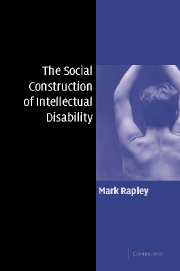Book contents
- Frontmatter
- Contents
- Acknowledgements
- A note on the cover illustration
- A note on transcription notation
- Introduction
- 1 A discursive psychological approach
- 2 Intellectual disability as diagnostic and social category
- 3 The interactional production of ‘dispositional’ characteristics: or why saying ‘yes’ to one's interrogators may be smart strategy
- 4 Matters of identity
- 5 Talk to dogs, infants and …
- 6 A deviant case (written with Alec McHoul)
- 7 Some tentative conclusions
- Appendices
- References
- Index
Appendices
Published online by Cambridge University Press: 20 October 2009
- Frontmatter
- Contents
- Acknowledgements
- A note on the cover illustration
- A note on transcription notation
- Introduction
- 1 A discursive psychological approach
- 2 Intellectual disability as diagnostic and social category
- 3 The interactional production of ‘dispositional’ characteristics: or why saying ‘yes’ to one's interrogators may be smart strategy
- 4 Matters of identity
- 5 Talk to dogs, infants and …
- 6 A deviant case (written with Alec McHoul)
- 7 Some tentative conclusions
- Appendices
- References
- Index
Summary
According to the Manual of Diagnosis and Professional Practice in Mental Retardation (American Psychological Association, 1996):
Mental retardation (MR) refers to (a) significant limitations in general intellectual functioning; (b) significant limitations in adaptive functioning, which exist concurrently; and (c) onset of intellectual and adaptive limitations before the age of 22 years.
(p. 13)The ICD-10 (World Health Organization 1992) and DSM-IV (American Psychiatric Association, 1994) use the same definition of mental retardation.
According to the Diagnostic and Statistical Manual of Mental Disorders, Fourth Edition: Diagnostic criteria for Mental Retardation:
A. Significantly subaverage intellectual functioning: an IQ of approximately 70 or below on an individually administered IQ test (for infants, a clinical judgement of significantly subaverage intellectual functioning).
B. Concurrent deficits or impairments in present adaptive functioning (i.e., the person's effectiveness in meeting the standards expected for his or her age by his or her cultural group) in at least two of the following areas: communication, self-care, home living, social/interpersonal skills, use of community resources, self direction, functional academic skills, work, leisure, health and safety. […]
- Type
- Chapter
- Information
- The Social Construction of Intellectual Disability , pp. 210 - 218Publisher: Cambridge University PressPrint publication year: 2004



